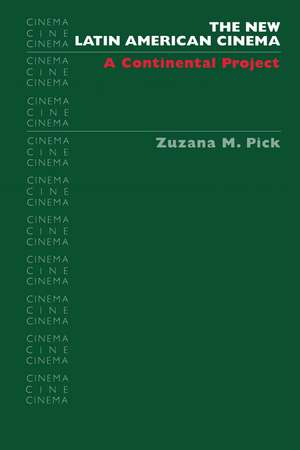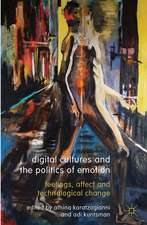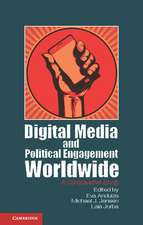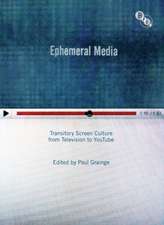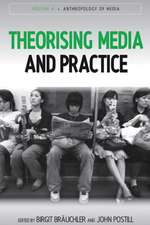The New Latin American Cinema: A Continental Project: Texas Film and Media Studies Series
Autor Zuzana M. Picken Limba Engleză Paperback – oct 1993
This book explores the institutional and aesthetic foundations of the New Latin American Cinema. Zuzana Pick maps out six areas of inquiry—history, authorship, gender, popular cinema, ethnicity, and exile—and explores them through detailed discussions of nearly twenty films and their makers, including Camila (María Luisa Bemberg), The Guns (Ruy Guerra), and Frida (Paul Leduc). These investigations document how the New Latin American Cinema has used film as a tool to change society, to transform national expressions, to support international differences, and to assert regional autonomy.
Din seria Texas Film and Media Studies Series
-
 Preț: 201.80 lei
Preț: 201.80 lei -
 Preț: 202.06 lei
Preț: 202.06 lei -
 Preț: 240.63 lei
Preț: 240.63 lei -
 Preț: 277.53 lei
Preț: 277.53 lei -
 Preț: 262.40 lei
Preț: 262.40 lei -
 Preț: 277.16 lei
Preț: 277.16 lei -
 Preț: 203.73 lei
Preț: 203.73 lei -
 Preț: 277.16 lei
Preț: 277.16 lei -
 Preț: 202.38 lei
Preț: 202.38 lei -
 Preț: 277.16 lei
Preț: 277.16 lei -
 Preț: 200.04 lei
Preț: 200.04 lei -
 Preț: 277.16 lei
Preț: 277.16 lei -
 Preț: 201.79 lei
Preț: 201.79 lei -
 Preț: 241.38 lei
Preț: 241.38 lei -
 Preț: 166.47 lei
Preț: 166.47 lei -
 Preț: 166.47 lei
Preț: 166.47 lei - 23%
 Preț: 501.82 lei
Preț: 501.82 lei - 23%
 Preț: 615.45 lei
Preț: 615.45 lei -
 Preț: 277.16 lei
Preț: 277.16 lei -
 Preț: 240.63 lei
Preț: 240.63 lei -
 Preț: 203.73 lei
Preț: 203.73 lei -
 Preț: 288.31 lei
Preț: 288.31 lei
Preț: 203.73 lei
Nou
Puncte Express: 306
Preț estimativ în valută:
38.99€ • 40.75$ • 32.95£
38.99€ • 40.75$ • 32.95£
Carte tipărită la comandă
Livrare economică 06-20 martie
Preluare comenzi: 021 569.72.76
Specificații
ISBN-13: 9780292765498
ISBN-10: 0292765495
Pagini: 263
Dimensiuni: 152 x 229 x 18 mm
Greutate: 0.41 kg
Editura: University of Texas Press
Colecția University of Texas Press
Seria Texas Film and Media Studies Series
Locul publicării:United States
ISBN-10: 0292765495
Pagini: 263
Dimensiuni: 152 x 229 x 18 mm
Greutate: 0.41 kg
Editura: University of Texas Press
Colecția University of Texas Press
Seria Texas Film and Media Studies Series
Locul publicării:United States
Notă biografică
Zuzana Pick is Professor of Film Studies at the School for Studies in Art and Culture at Carleton University, Ottawa. Her previous publications include Latin American Film Makers and the Third Cinema.
Cuprins
- Preface and Acknowledgments
- Introduction. The New Latin American Cinema: A Continental Project
- 1. Convergences and Divergences
- History and Institutions
- Pioneers and Early Manifestations
- Birth of a Movement
- State Intervention and Growth
- Turning Point and Consolidation
- 2. Creativity and Social Intervention
- Authorship and Cultural Militancy
- The Discovery of Self and Other: The Brickmakers
- The Authority of Daily Life: Up to a Point
- The Collective and the Nation: The Hour of the Furnaces
- 3. Gendered Identities and Femininity
- Women Filmmakers and Representations of Gender
- Machismo and Gender: A Man, When He Is a Man
- Experiences of Femininity: Mujer transparente
- Reviewing Women’s History: Camila
- Identity and Representation: Frida: Naturaleza viva
- 4. Popular Memory and the Power of Address
- Popular Cinema and Social Class
- Social Inquiry and Los inundados
- The Sertao and Cinema Nôvo: The Guns
- Popular Memory and The Courage of the People
- 5. Cultural Difference and Representation
- Ethnicity and Mestizaje
- The Dialectics of Race and Class: One Way or Another
- Metaphor and Difference: Iracema
- The Aesthetics of Carnival: Quilombo
- Immigration and Identity: Gaijin: The Road to Liberty
- 6. Exile and Displacement
- Exile: Discourse and Representation
- The Politics of the Personal: Unfinished Diary
- Spectacle and the Displaced Body: Tangos: The Exile of Gardel
- Phantasmagoria and Displacement: The Three Crowns of the Sailor
- Conclusion. The New Latin American Cinema: A Modernist Critique of Modernity
- Notes
- Bibliography
- Index
Descriere
This book explores the institutional and aesthetic foundations of the New Latin American Cinema.
